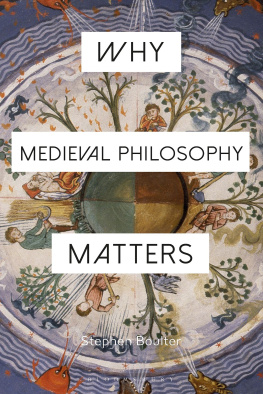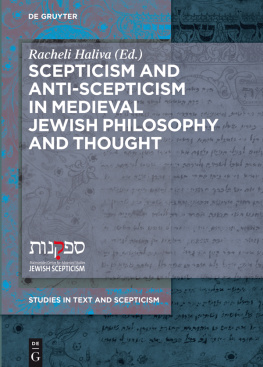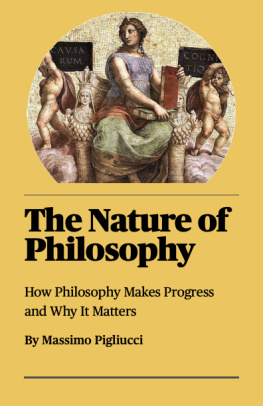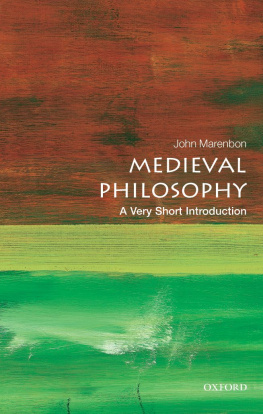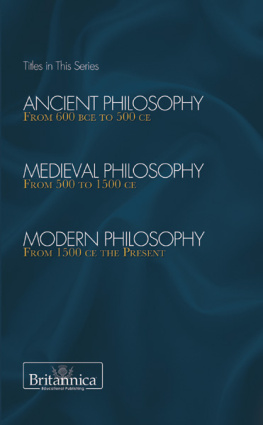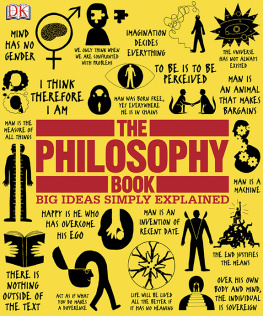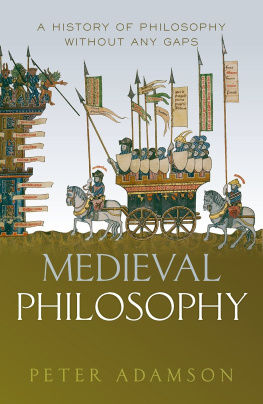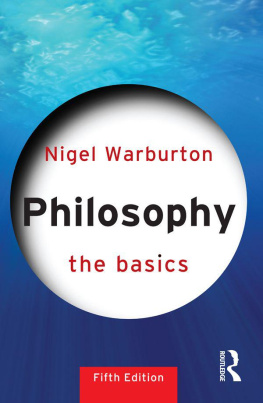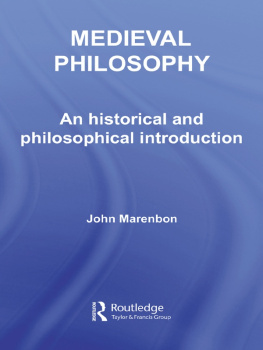Why Medieval Philosophy Matters
Why Philosophy Matters
Series editor: Professor Constantine Sandis, University of Hertfordshire, UK
Why Philosophy Matters focuses on why a particular philosopher, school of thought, or area of philosophical study really matters . Each book will offer a brief overview of the subject before exploring its reception both within and outside the academy and our authors will also defend different provocative outlooks on where the value of philosophy lies (or doesnt, as the case may be). Why Philosophy Matters is accompanied by an ongoing series of free events (talks, debates, workshops) in Bloomsbury. Podcasts of these events will be freely available on the series page.
Books in this series
Why Iris Murdoch Matters, Gary Browning
Also available from Bloomsbury
Medieval Philosophy: A Multicultural Reader, Bruce Foltz
Technic and Magic, Federico Campagna
Why Medieval Philosophy Matters
STEPHEN BOULTER

Contents
A new approach
Philosophers with a special interest in medieval thought have spent much time and effort expounding the virtues of scholastic principles to other professionals in the discipline. Indeed, it might appear that specialists in medieval philosophy have been doing little else since serious work began on the project of recovering the thought of the scholastics well over a century and a half ago. Our collective endeavours have continually been straining in the same direction making the case for medieval philosophy to the philosophical mainstream. So why yet another work on why medieval philosophy matters? Surely if there is a case to be made for medieval philosophy it has been made by now.
There is a sense in which this is right, and another in which it is wrong. It is right insofar as medieval specialists have been particularly adept at showing how familiarity with scholastic thought can help the contemporary philosopher address highly specialized issues of ongoing concern in metaphysics, epistemology, philosophy of mind and ethics. Moreover, a significant body of work has been produced which shows that the roots of early modern philosophy a period with which the philosophical mainstream is familiar lie deep within scholasticism itself. This two-pronged approach, philosophical and historical, has been popular amongst medieval specialists seeking to establish a dialogue between scholastic and contemporary philosophy.
Regrettably these efforts have had little impact on the philosophical mainstream. It had been hoped that the landmark publication in 1982 of The Cambridge History of Later Medieval Philosophy would inaugurate a new period in which contemporary philosophers would no longer work in ignorance of medieval achievements. But as John Marenbon notes in his introduction to The Oxford Handbook of Medieval Philosophy of 2012, these hopes have largely failed to materialize. Medieval philosophy remains a minority interest within the profession, with many philosophy departments still having no specialist on staff.
In retrospect it is easy to see that our hopes were misplaced. It is not just that philosophers entertain the usual suspicions of things medieval, although this is a significant factor. Just as important is the current state of the discipline. As with virtually all subjects, philosophy has become increasingly specialized, and those working in one domain rarely have anything to say to those working in another. But more than this, the discipline as a whole has fragmented into isolated camps with distinct self-images, agendas, projects and methodologies. These very different understandings of the philosophical enterprise compromise the prospects of meaningful dialogue amongst contemporary philosophers themselves. In such an environment it was always going to be difficult to win a ear for an alien medieval voice.
There is therefore an important sense in which the case for medieval philosophy has yet to be made, if we understand this to mean finding a way to make the case resonate with non-specialists. But the Why Philosophy Matters series provides the occasion for considering a different way to champion medieval philosophy. This series is a response to the growing impression abroad in society at large that philosophy as a discipline is redundant. This series calls on philosophers to push back against this redundancy thesis. Now I maintain that it is in confronting this challenge that medieval and contemporary philosophy can make common cause. The overarching thesis of this book is that those familiar with scholastic thought are uniquely well placed to make the case for philosophy within the wider intellectual community precisely because the scholastic understanding of the discipline, along with its fundamental principles and methodologies, will resonate with those who entertain doubts about the usefulness of philosophy. My hope, then, is to win a new audience for medieval philosophy on the basis that it is uniquely well positioned to show why philosophy itself is anything but redundant. As the discipline continues to come under attack from without, making the case for philosophy matters, and scholasticism can help.
A word of warning is in order. The focus on philosophys external relations with other disciplines and society at large makes for an unusual book on medieval thought. There are more orthodox ways in which one might try to show that medieval philosophy matters, and these are worth pointing out if only to underline the fact that the case made in this book is only one way to champion the period. Perhaps the most obvious way is to assert that all periods of history matter, and so medieval history matters as well. And since the period is standardly taken to span a thousand years (from 500 to 1500), and to have marked the transition from the ancient to the modern world, it would be very odd if nothing of importance had happened in this period. This is the route taken by some intellectual historians. Another approach is to focus on showing how medieval thought can help the contemporary philosopher deal with contemporary internal problems. Here the idea is to establish that a contemporary philosopher can treat medieval thinkers as worthy colleagues. The contemporary school of analytical Thomism is an obvious example of this approach. A third takes issue with the first two. There is a school of thought popular with some medieval specialists which insists that there is little point trying to recover medieval thought for the benefit of contemporary philosophers. According to this school medieval philosophy is so different from contemporary philosophy that there can be no fruitful dialogue between the two. It is not even clear if we can recover what the medieval figures were saying: so different was their mode of thought. On this view the best we can do is merely enjoy the difference of the other in contemplating them. If medieval philosophy matters, it is only because appreciating their difference can bring our own, perhaps unrecognized, assumptions into the light.
While all of these approaches have their merits, I have not adopted them here. There are plenty of good histories available already, and many highly professional works linking medieval and contemporary thought. What is missing is a book which outlines a case for the importance of medieval thought to matters of general interest, and to the pressing matter of philosophys relation to the wider intellectual world. This is why I have tried to connect aspects of the medieval scholastic framework to issues of general concern, to things that clearly do matter, or ought to matter, to the general reader.

